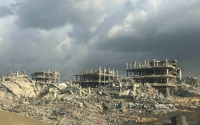Peter Beaumont, Gaby Hinsliff and Paul Beaver4 August, 2002
President George W. Bush will announce within weeks that he intends to depose Iraq's ruler, Saddam Hussein, by force, setting the stage for a war in the Gulf this winter.
Amid signs of active preparations for a war within six months, senior officials on both sides of the Atlantic have said that war against Iraq is now inevitable.
'The expectation is that President Bush will make a final decision on the timing of a war over the course of August. That would be followed by British-led efforts to get a mandate for action at the UN, either under existing resolutions or a new UN resolution,' said one senior source.
The disclosure came as US Secretary of State Colin Powell dismissed an offer by Iraq to talk to the chief weapons inspector of the United Nations. 'Inspection is not the issue, disarmament is, making sure that the Iraqis have no weapons of mass destruction,' said Powell during a visit to Manila, capital of the Philippines.
'We have seen the Iraqis try to fiddle with the inspection system before,' said Powell. 'You can tell that they are trying to get out of the clear requirement that they have. The goal is not inspections for inspection's sake.'
The escalation of US military efforts comes amid signs of the first serious split between the White House and Britain over the relentless march to war.
That split emerged yesterday after John Bolton, US Under Secretary for Arms Control, admitted that the aim in Washington was to topple Saddam regardless of whether or not he allowed UN inspectors back in to complete the disarmament process.
'Let there be no mistake - while we also insist on the reintroduction of the weapons inspectors, our policy at the same time insists on regime change in Baghdad and that policy will not be altered, whether inspectors go in or not,' Bolton told Radio 4's Today programme. He said he 'certainly hoped' Saddam would be deposed within the year.
His words set alarm bells ringing in London, since the legality of any attack on Iraq - already questioned by the Government's own lawyers - depends on claiming to be acting against infringements of the post-Gulf War disarmament pact rather than simply overthrowing a dictator. Foreign Office sources were quick to dissociate the Foreign Secretary from Bolton's comments.
'Jack Straw has always said that the aim of our policy would not be regime change,' said a Foreign Office source.
In a further indication of preparations for war on both sides of the Atlantic, Tony Blair is expected to begin a campaign of softening up public opinion for war in the autumn. Bruce George, chairman of the Commons Defence Select Committee, said the Government 'will have to have started explaining' its case by then to reverse polls now showing strong opposition to war.
Bolton's comments came as new evidence emerged of US preparations for war, including the building up of strategic oil reserves in the US to insulate the economy against an expected hike in oil prices that would follow the opening of hostilities.
Discreet inquiries have also been made about the availability of the oil tankers that would be needed to transport aviation and other fuel to the Gulf for use by US forces.
In a further indication that America is readying itself for war, large numbers of US Army military trucks have undergone rapid servicing by the Oshkosh Truck Corporation and have been seen being delivered by rail back to their bases painted in tan desert camouflage.
Blair yesterday faced new demands from all sides to publish the now notorious dossier of information on Saddam's nuclear, biological and chemical armoury that he has been promising to unveil since spring.
'The British public deserves to be treated with respect. We must know what the evidence is, and the evidence has got to be compelling,' said Tony Lloyd, the ex-Foreign Office Minister.
The long delay in publication has prompted suspicions that the dossier, which relies heavily on satellite pictures, is embarrassingly thin.
'By delaying publication the Government has raised expectations. There would be a political price to pay if this much promised document did not amount to more than a collection of press cuttings,' said Menzies Campbell, the Liberal Democrats' foreign affairs spokesman.
The determination of Bush and his closest officials to go ahead with a war has also come amid growing evidence of splits within his own administration.
Senior officials, however, anticipate that Bush will bring an end to the debate by ordering the Pentagon to prepare for war. Most in the administration expect a fairly swift victory.
'I'm absolutely convinced the President will settle on a war plan that brings about regime change,' a senior Republican foreign policy specialist told the Washington Post last week.






